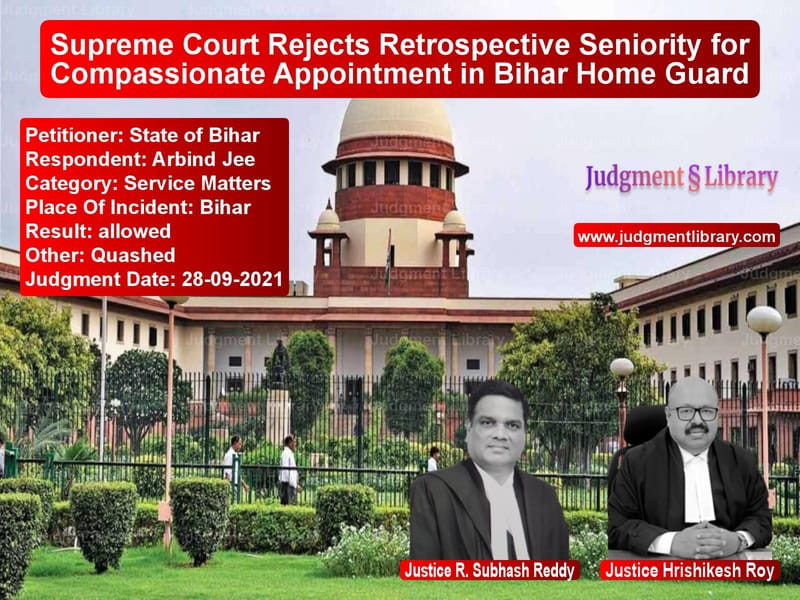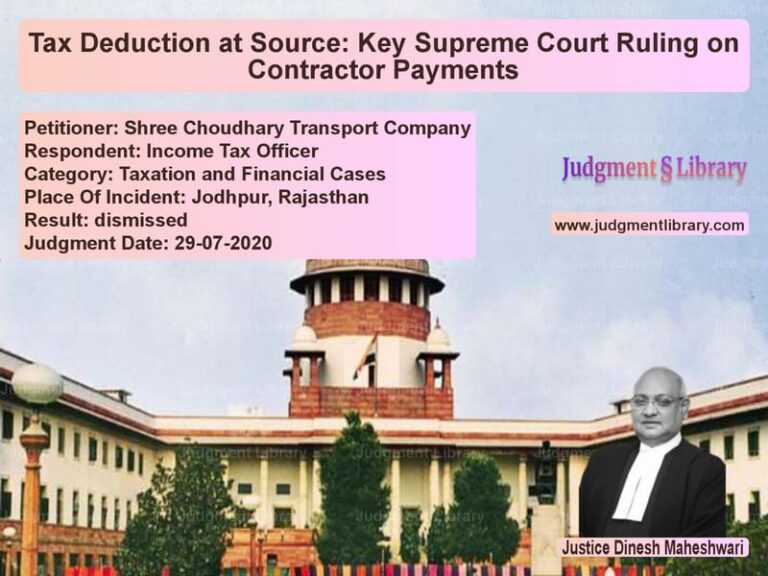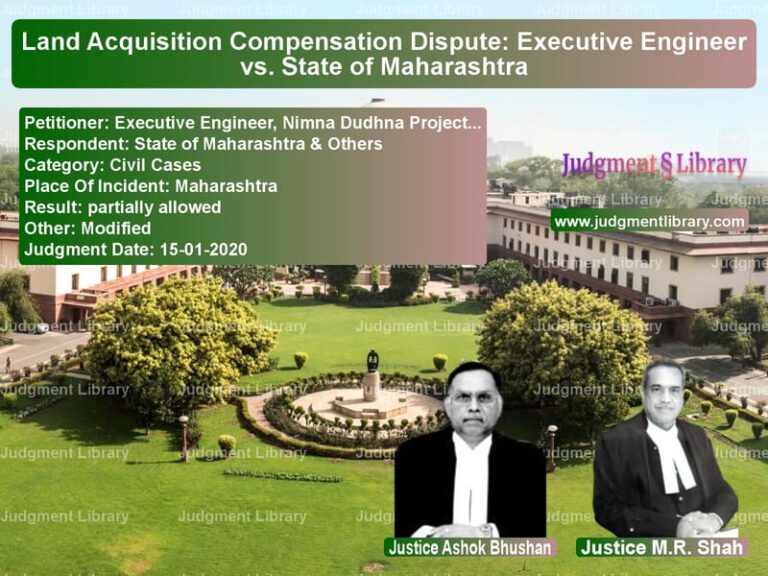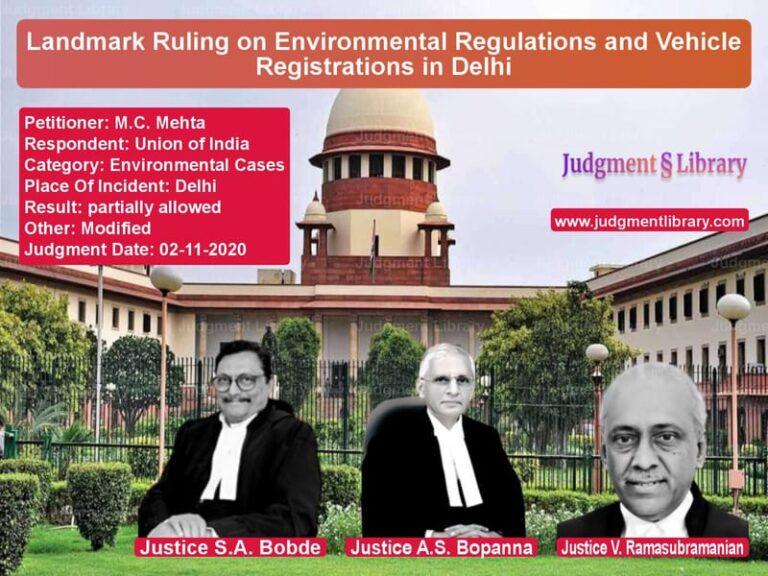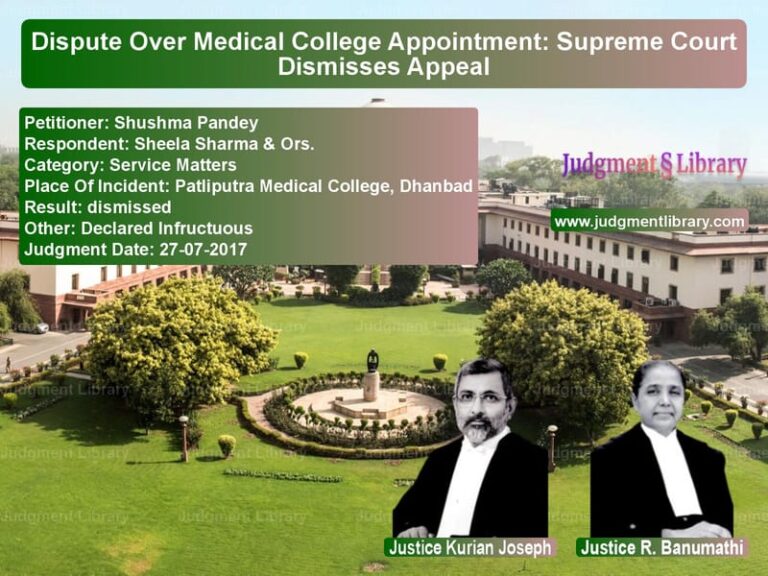Supreme Court Rejects Retrospective Seniority for Compassionate Appointment in Bihar Home Guard
The Supreme Court of India recently delivered a significant ruling in a case involving the claim of retrospective seniority by an individual appointed on compassionate grounds in the Bihar Home Guard. The case centered on whether an employee who was denied appointment in 1985 but later appointed in 1996 based on the Supreme Court’s directive could claim seniority from the earlier date.
Background of the Case
The respondent, Arbind Jee, had applied for compassionate appointment following the death of his father, who was serving in the Bihar Home Guard. The appointment process required a physical fitness assessment. Although his name was included in a list of shortlisted candidates on November 20, 1985, his appointment was denied after he failed to meet the required physical standards.
Subsequently, he moved the Patna High Court, which granted him appointment in a Class IV post. Unsatisfied with this, he approached the Supreme Court through an appeal (Civil Appeal No. 220 of 1996). The Supreme Court ruled in his favor and directed the Bihar government to appoint him as ‘Adhinayak Lipik’ within one month.
Following this order, the respondent was officially appointed on February 27, 1996. However, six years after joining service, he filed a representation on September 10, 2002, claiming seniority from December 5, 1985. The authorities rejected this request, stating that he was appointed in 1996 and was not in service in 1985. He then challenged this rejection in the Patna High Court, which ruled in his favor. The Bihar government subsequently appealed this decision before the Supreme Court.
Legal Issues Considered
- Whether an individual appointed in 1996 could claim seniority from 1985 when he was not in service during that period.
- The legal principle that retrospective seniority cannot be granted unless expressly provided by law or a court order.
- The impact of granting retrospective seniority on other employees who joined between 1985 and 1996.
Arguments by the Appellant (State of Bihar)
- The government argued that the respondent was denied appointment in 1985 due to failing the physical fitness test and that his appointment in 1996 was based on the Supreme Court’s directive.
- They contended that the respondent’s appointment in 1996 was prospective and that he had accepted the appointment without any condition regarding seniority.
- Granting him retrospective seniority would unfairly affect employees who joined between 1985 and 1996.
- The claim for retrospective seniority was filed six years after his appointment, making it legally untenable.
Arguments by the Respondent
- The respondent argued that since he was initially shortlisted for appointment in 1985, his seniority should be counted from that date.
- He claimed that his appointment was delayed due to an unfair denial based on physical fitness standards, which was later corrected by the Supreme Court.
- The Patna High Court had correctly recognized that his appointment should be deemed effective from the date of the original selection.
Supreme Court’s Observations
The Supreme Court, comprising Justices R. Subhash Reddy and Hrishikesh Roy, carefully examined the legal principles involved in the case. The key observations included:
- Retrospective seniority cannot be claimed by an employee from a date when they were not in service. The principle laid down in Direct Recruit Class II Engineering Officers’ Association v. State of Maharashtra was reaffirmed.
- The earlier Supreme Court ruling only directed the respondent’s appointment but did not specify any retrospective seniority benefits.
- The respondent accepted the appointment in 1996 without raising any claim for retrospective seniority until 2002.
- Allowing his claim would adversely affect the seniority and rights of employees who were duly appointed between 1985 and 1996.
Final Judgment
The Supreme Court allowed the appeal and set aside the Patna High Court’s order. The key directives included:
- The respondent’s seniority shall be counted from February 27, 1996, the date of his actual appointment.
- His claim for seniority from December 5, 1985, was rejected.
- The existing seniority list would remain unchanged, and no retrospective benefits would be granted.
Conclusion
This ruling reinforces the well-established principle that seniority in service can only be granted from the date of actual appointment unless otherwise directed by law or a court ruling. The Supreme Court’s decision ensures fairness in public employment and prevents undue advantages based on retrospective claims.
The judgment also serves as a precedent in cases where individuals seek retrospective benefits based on earlier selection processes. It upholds the integrity of service rules and ensures that employees who join through a competitive and merit-based process are not unfairly displaced.
Petitioner Name: State of Bihar.Respondent Name: Arbind Jee.Judgment By: Justice R. Subhash Reddy, Justice Hrishikesh Roy.Place Of Incident: Bihar.Judgment Date: 28-09-2021.
Don’t miss out on the full details! Download the complete judgment in PDF format below and gain valuable insights instantly!
Download Judgment: state-of-bihar-vs-arbind-jee-supreme-court-of-india-judgment-dated-28-09-2021.pdf
Directly Download Judgment: Directly download this Judgment
See all petitions in Employment Disputes
See all petitions in Promotion Cases
See all petitions in Public Sector Employees
See all petitions in Judgment by R. Subhash Reddy
See all petitions in Judgment by Hrishikesh Roy
See all petitions in allowed
See all petitions in Quashed
See all petitions in supreme court of India judgments September 2021
See all petitions in 2021 judgments
See all posts in Service Matters Category
See all allowed petitions in Service Matters Category
See all Dismissed petitions in Service Matters Category
See all partially allowed petitions in Service Matters Category

